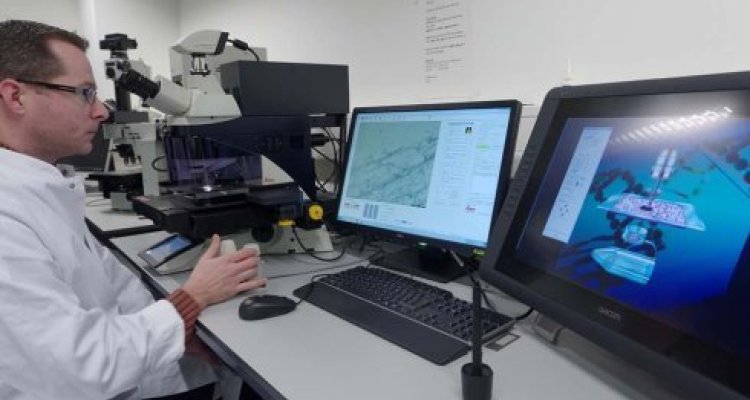
News
Laser dissection for research into individual cells
The Laboratory for Molecular Biology at Wageningen University recently purchased a laser system which will enable the dissection of individual cells from the surrounding plant tissue. This equipment makes it possible to determine the development stage and activity of DNA and biosynthetic routes for individual cells. As it has been purchased with the financial support of CAT-AgroFood, the Leica LMD7000 Laser Microdissection System can also be used by companies and knowledge organisations outside of Wageningen UR.
Molecular Biology involves lots of research into the interaction between soil micro-organisms and the plant. “We really want to isolate specific cells infected with a bacterium or fungus to determine which genes in these cells are ‘switched on’,” says molecular biologist and expert fluorescence emission spectroscopy Erik Limpens. “Or follow the stages of cell development and see which genes are involved in the interaction with Rhizobium – the bacteria that produces. This requires the dissection of individual cells.”
New research options
The Leica LMD7000 Laser Microdissection System was purchased for this purpose in early 2015 and has considerably simplified the work. Lab technicians first cut a thin slice of the material and place it on a membrane slide. They then use a monitor to enlarge the slice up to 63 times, which is enough to get a proper look at cells and cell organelles. The lab technician then indicates which segment or which cell should be dissected, and the laser does the rest. The dissected cells are dropped into a container and can be used to isolate DNA, RNA or protein. “You can also dissect living cells and cultivate them,” Limpens adds.
Open to companies and knowledge institutes
The system costs around 150,000 euros and is often too expensive for organisations to purchase themselves. Limpens: “This is why we purchased the Leica LMD7000 with support from CAT-AgroFood. It makes the investment feasible for us, and also allows other researchers to use the device at an attractive hourly rate.”
CAT-AgroFood supports the purchase of high-tech equipment which is shared with companies and other knowledge institutes. An overview of the facilities is available via the website.